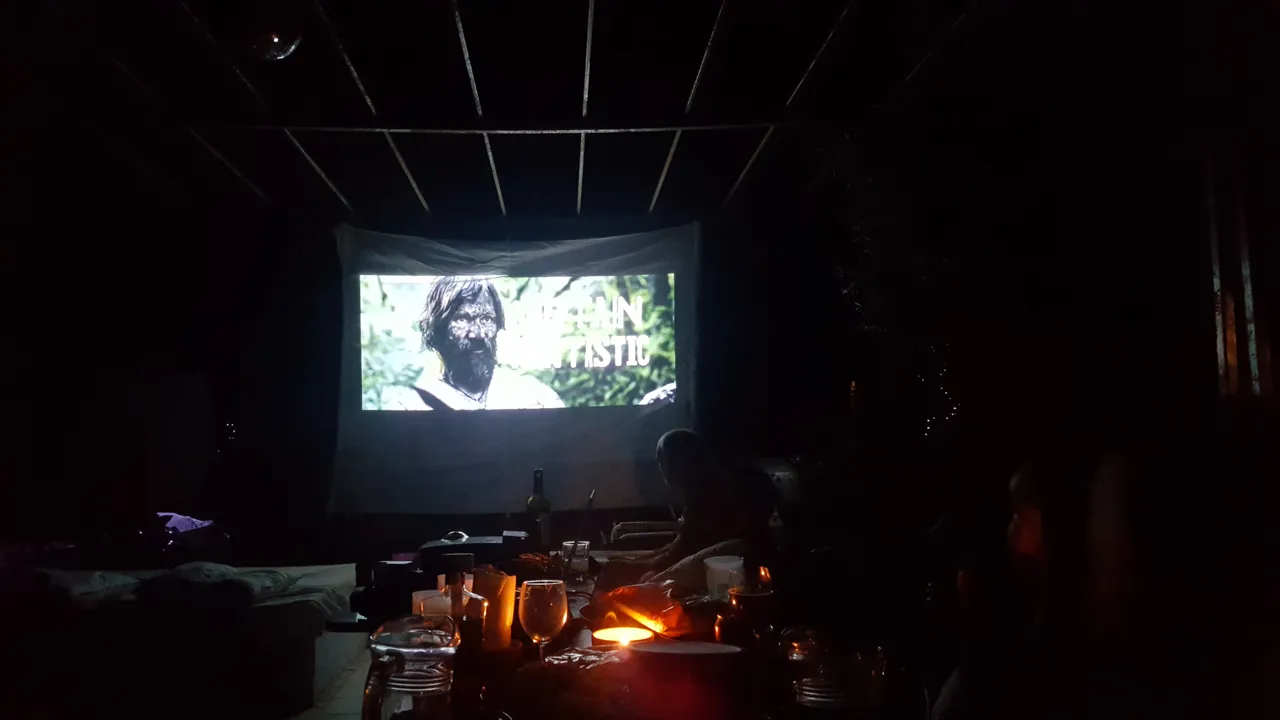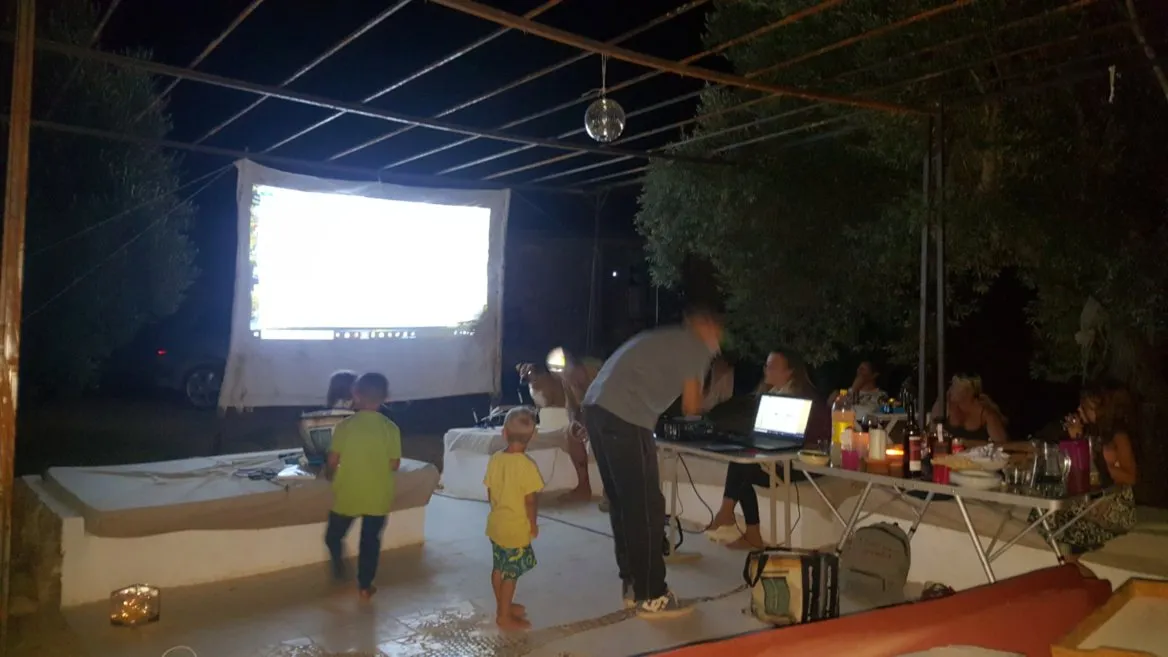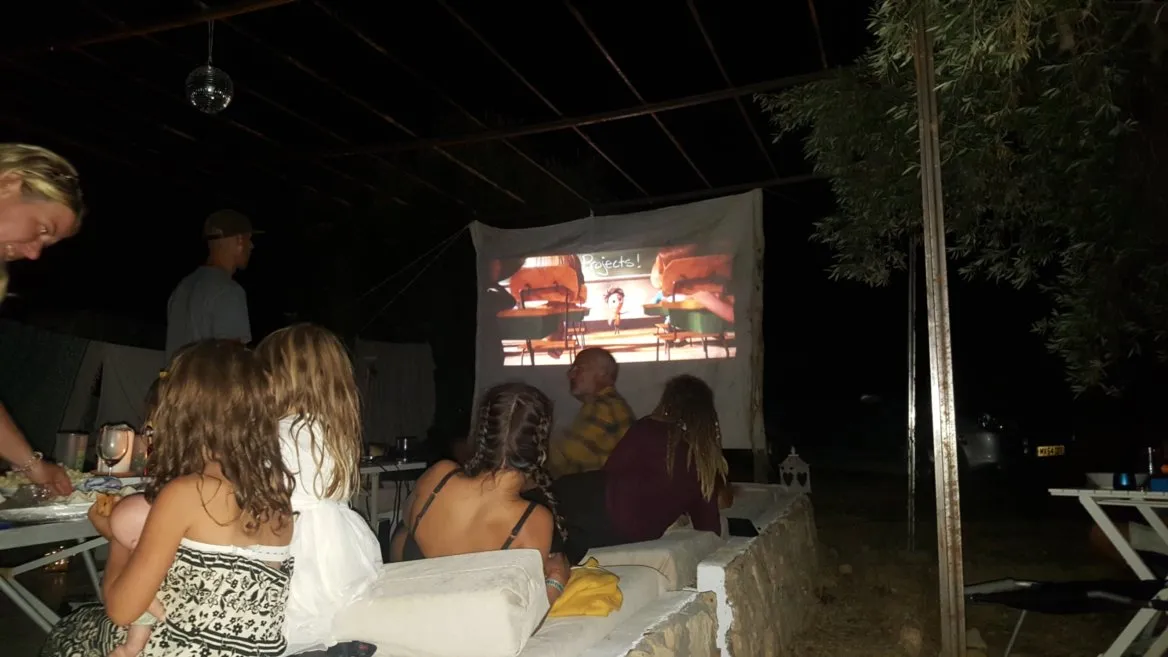Greetings amazing humans. This post is a little anecdote from my family's offgrid adventures. I decided to incorporate it with my thoughts on the importance of human connection as a natural medicine.
In August 2018 my family moved to the northeast of Spain to live offgrid.
After 1 month, we were hanging out at the neighbor's land enjoying some al fresco movie time, and what better way to kick it off with a lovely movie for the children and end it with the movie that inspired me to want to move offgrid; Captain Fantastic.

Below is an excerpt of a post I was writing on the night, that somehow stayed saved on my account:
It is a warm evening and I can feel a gentle breeze caressing my skin. The stars are bright, even in the light of the waxing moon. Laughter and the sound of a packet of potato chips crackling accompany the chirping of crickets as the movie plays on the projector.
The boys have drifted off to sleep and the movie is about halfway through. The inverter beeps and the projector shuts off. We spend the next ten minutes shutting down and rebooting. We unplug the internet and move the extension cable to another socket.
Just some of the joys of offgrid life. We laugh and joke about it and reflect on how this is unheard of when connected to the grid.
The projector turns on and the movie resumes. We settle down and relax in the comfort of the cushions.
I am feeling quite blissful and content with our new life, enjoying the company of the other members of the community. this is really beginning to feel like home...
A little bit about how we were able to do this.
The projector managed to survive the move from Sark with us. It wasn't on my list of priority brings but my boy's father felt that it may come in handy. Which, as it turns out, it actually did.
The man who owned the land next door (which was actually about a ten-minute walk away), had recently returned to Australia and asked the other family living in the community to house sit for him. He had a pretty decent solar setup. 12 Panels, a good battery system but his inverter was a little tired.

The owner liked to entertain and his then-fiancee intended to build a yoga retreat. This space was designed to be the lounge area. There are built-in lounge beds topped with homemade cushions to sit or lay down on.
We decided to use the space to enjoy the offgrid movie night. It was a wonderful way to relax and unwind. There were a few issues with the inverter cutting out. This was mainly down to the batteries not being able to cope with the amount of electricity being used.
The house has a fridge freezer, an electric pump for the water catchment to the house, and a satellite internet system. Adding the projector and the laptop into the mix made it scream though.
The battery system was comprised of 6 heavy-duty lead-acid batteries, which seemed to do the job for the house. These are huge batteries, the type that power heavy goods or farming vehicles.
The inverter was set to alarm when the batteries reach 50% discharge. It is my understanding that this is the optimal setting needed for lead-acid because they will cycle down too quickly and lose their charging ability if they consistently run below this. It's important to understand this when living offgrid otherwise it will end up costing a fortune in replacing batteries, as well as being harmful to the environment.
(However, if I have understood this wrong, please correct me in the comments. This is just what I learned from being offgrid but if any other offgridders here on hive have more experience in this department, please let me know.)
The solar panels are placed in a good south-facing spot on the roof of the house. They provide enough charge during the day to keep everything running smoothly. Except in the winter when the lack of daylight hours, and reduced sunlight due to the land being sat in a valley, means the batteries work harder and for longer. The fridge needs to be unplugged as it really eats into the battery charge. On the plus side, it gets pretty cold there in the winter so it is possible to have a cold store on a north-facing wall.
To resolve the issue and save the batteries from running out of charge we unplugged the satellite internet system. We were able to enjoy the movie without any more power outages.
The screen was brought to us courtesy of a bedsheet. We tied it up at one end of the pavilion. It was flapping slightly in the breeze but didn't disturb our viewing experience at all.
Community living and helping each other out is medicine in the form of humanity.

When we first moved offgrid, we really didn't have much knowledge about solar, inverters, and batteries. We had to learn quickly and were fortunate enough to have more experienced friends on hand to help us with this huge learning curve.
There is a huge difference in the way people interact in a community setting to that of living in a city or town. It's a more supportive environment, one where our interactions are nurtured. We feel valued and appreciated and in turn, we reciprocate this value and appreciate others in a way that has become extinct in modern societies.
Our community dinners were a way to reflect, laugh, feel and enjoy being present with each other. Listening to good music, or as in this case, enjoying a rare treat of a movie night, while enjoying good food and being surrounded by nature. The contrast between on-grid and offgrid life was immeasurable.
Living in a modern and civilized way may bring materialistic pleasures that can temporarily increase our dopamine levels, but it doesn't even come close to the natural medicine that genuine and loving human interaction can provide.
~ONE LOVE~


CommunityIIDiscord
